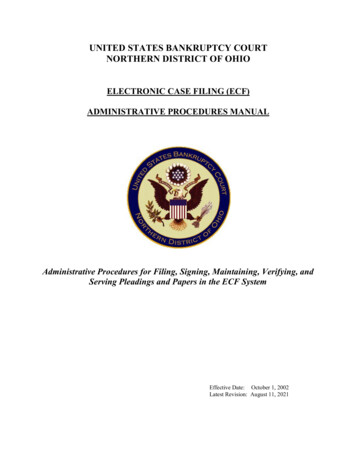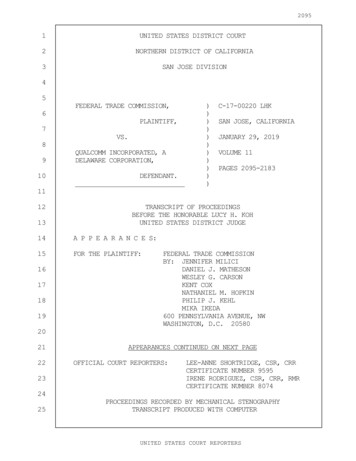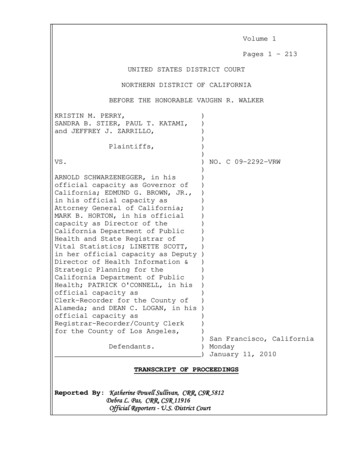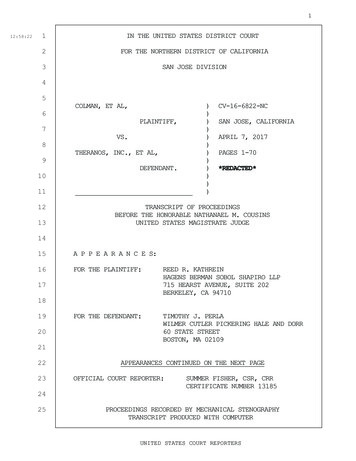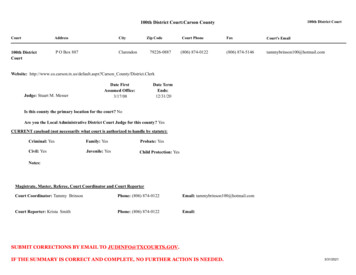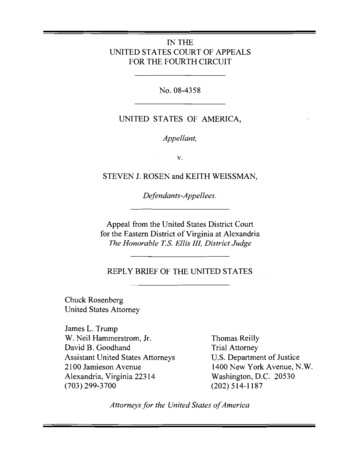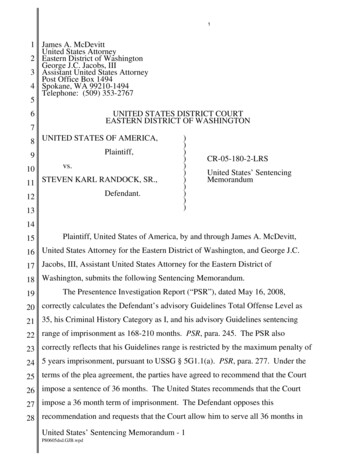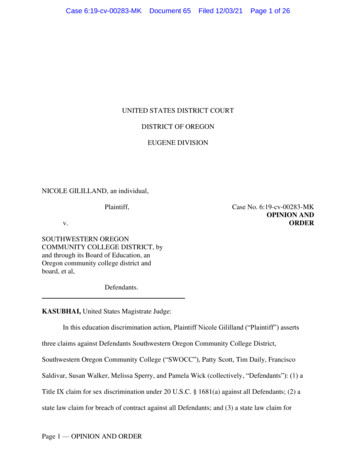
Transcription
Case 6:19-cv-00283-MKDocument 65Filed 12/03/21Page 1 of 26UNITED STATES DISTRICT COURTDISTRICT OF OREGONEUGENE DIVISIONNICOLE GILILLAND, an individual,Plaintiff,v.Case No. 6:19-cv-00283-MKOPINION ANDORDERSOUTHWESTERN OREGONCOMMUNITY COLLEGE DISTRICT, byand through its Board of Education, anOregon community college district andboard, et al,Defendants.KASUBHAI, United States Magistrate Judge:In this education discrimination action, Plaintiff Nicole Gililland (“Plaintiff”) assertsthree claims against Defendants Southwestern Oregon Community College District,Southwestern Oregon Community College (“SWOCC”), Patty Scott, Tim Daily, FranciscoSaldivar, Susan Walker, Melissa Sperry, and Pamela Wick (collectively, “Defendants”): (1) aTitle IX claim for sex discrimination under 20 U.S.C. § 1681(a) against all Defendants; (2) astate law claim for breach of contract against all Defendants; and (3) a state law claim forPage 1 — OPINION AND ORDER
Case 6:19-cv-00283-MKDocument 65Filed 12/03/21Page 2 of 26intentional infliction of emotional distress against Defendants Scott, Daily, Saldivar, Walker,Sperry, and Wick.1 Compl. ¶¶ 28–63, ECF No. 1. Defendants move for summary judgment as toall of Plaintiff’s claims. Defs.’ Mot. Summ. J., ECF No. 36 (“Defs.’ Mot.”). In addition, Plaintiffmoves for sanctions for spoliation of evidence. Pl.’s Mot. Sanctions, ECF No. 50 (“Pl.’s Mot.”).For the reasons that follow, Defendants’ motion is GRANTED in part and DENIED in part andPlaintiff’s motion is GRANTED in part and DENIED in part.FACTSIn Fall 2017, Plaintiff began her studies in Defendant SWOCC’s nursing program.Compl. 4, ECF No. 1. In Spring 2018, Plaintiff enrolled in three nursing courses: NRS 112(Foundations of Nursing in Acute I), NRS 231 (Clinical Pharmacology II), and NRS 233(Pathophysiology Processes II). Reese Decl., Ex. 34, ECF No. 37 (“Reese Decl.”). DefendantSperry taught NRS 112, and Ms. Robin Finney taught NRS 233. Reese Decl., Ex. 36.During the Spring 2018 semester, Plaintiff believes “an individual informed SWOCC thatPlaintiff was a former adult model and actress” and that Defendant Sperry became aware ofPlaintiff’s former career. Compl. 4, ECF No. 1. Plaintiff shared with one of her fellow students,J.M., that she previously worked as an adult film actress. Gililland Dep. 156:17–158:6, ECF No.41-1 (“Gililland Dep.”). At the time, J.M. “was under threat of expulsion for reasons that hadnothing to do with [Plaintiff],” but because J.M. “[became] erratic and accusatory toward[Plaintiff] as [J.M.’s] expulsion played out,” Plaintiff wanted to “prepar[e]” and tell DefendantSperry about her past. Pl.’s Resp. 7, ECF No. 41. Plaintiff told Defendant Sperry via email thatPlaintiff confided in J.M. about “some things [in her] past that [she was] not proud of back when[she] was a teenager” and worried that J.M. “could really embarrass [her].” Sperry Dep. 21:19–1Plaintiff withdraws her state law claims for negligent supervision and intentional interference with economicrelations. See Pl.’s Resp. 35 n.9, ECF No. 41.Page 2 — OPINION AND ORDER
Case 6:19-cv-00283-MKDocument 65Filed 12/03/21Page 3 of 2623:24, ECF No. 41-5 (“Sperry Dep.”). After Plaintiff sent that email, Defendant Sperry startedacting “odd” toward Plaintiff. Gililland Dep. 80:4–81:10, 87:14–88:2. Defendant Sperry alsoforwarded Plaintiff’s email twice to Defendant Walker. Walker Dep. 15:15–18:8, ECF No. 41-4(“Walker Dep.”); Sperry Dep. 24:13–16, 86:4–87:15.In the months that followed, Defendant Sperry changed from being “superficiallyfriendly” to acting “odd” toward Plaintiff. Gililland Dep. 80:4–81:10, 87:14–88:2. WhenPlaintiff fell ill in April 2018 and asked to take an exam early in NRS 112, Defendant Sperry toldher to complete an alternative assignment. Gililland Dep. 73:22–75:13. However, DefendantSperry sent Plaintiff the wrong assignment, claimed she assigned a different assignment, andgave Plaintiff a zero on the wrong assignment Plaintiff submitted. Gililland Dep. 75:17–81:10.When Plaintiff later completed her make-up test, the same one she asked to take early, DefendantSperry assessed a ten-percent late penalty. Gililland Dep. 88:3–90:10; Sperry Dep. 34:23–35:3.Defendant Sperry permitted other students to take tests early to avoid a penalty. Kyelberg Decl.8–9, ECF No. 43.At some point in the semester, Plaintiff approached Defendant Sperry and asked her“why she was doing” all this to Plaintiff. Gililland Dep. 91:9–21. Defendant Sperry respondedthat “it takes a classy woman to be a nurse, and unclassy women”—“kind of pointing” atPlaintiff—“shouldn’t be nurses.” Gililland Dep. 91:11–94:2. Defendant Sperry suggestedPlaintiff approach Defendant Walker regarding her grades. Gililland Dep. 91:9–21, 93:11–94:2.Plaintiff did so, and Defendant Walker supported Defendant Sperry’s decision on the latepenalty. Gililland Dep. 94:7–21.In April 2018, Plaintiff completed an assignment for Ms. Finney’s NRS 233 class inwhich Plaintiff “copied descriptions of certain relevant health conditions of medical journalPage 3 — OPINION AND ORDER
Case 6:19-cv-00283-MKDocument 65Filed 12/03/21Page 4 of 26articles she found online, which she had been told by [ ] SWOCC faculty was acceptablepractice.” Pl.’s Resp. 9, ECF No. 41 (citing Gililland Dep. 96:22–97:6). Ms. Finney initiallygraded the assignment on the merits, but later consulted with Ms. Sperry regarding possibleplagiarism. Reese Decl., Ex. 82 at 2–3. On April 25, 2018, Ms. Finney awarded Plaintiff zeropoints. Reese Decl., Ex. 37 at 3. Defendant Sperry then examined Plaintiff’s work submitted forother classes and placed Plaintiff in deficiency based on plagiarism. Sperry Dep. 51:19–53:25;Reese Decl., Ex. 41. Defendant Sperry also compiled the materials Plaintiff copied and sent themto Defendant Walker. Sperry Dep. 42:2–44:1. However, Defendant Sperry did not check any ofPlaintiff’s peers’ assignments for plagiarism. Sperry Dep. 51:3–18, 47:18–25, 57:5–11.On April 25, Plaintiff told Defendant Walker that she felt targeted by Defendant Sperryand that she believed copying from materials was an accepted practice at SWOCC. Walker Dep.28:2–29:6. Defendant Walker then told Plaintiff that Defendants would hold an expulsionhearing for her on Monday, April 30, 2018. Reese Decl., Ex. 42 at 1.On April 26, Plaintiff emailed Ms. Finney:I can think of legitimate plagiarism committed by every singlestudent. . . . This is absolutely a program wide issue. I think thefact that [Defendant Sperry] failed to see the plagiarism [by otherstudents] on her case studies, but found it on mine in your class isjust further evidence of her unethical behavior towards me becauseliterally every student is guilty of this, all you have to do is look. Iwill not have my reputation and future destroyed over this simplybecause [Defendant Sperry] is abusing power[.]Reese Decl., Ex. 43 at 1. Plaintiff then met with Defendant Daily, Vice President of Enrollmentand Student Services and SWOCC’s Title IX Coordinator, to try to figure out “why she has beensingled out.” Reese Decl., Ex. 44 at 3. At that meeting, Plaintiff asked “if she should have alawyer” for the expulsion hearing, and was told that there would not be an expulsion hearing ifshe did obtain an attorney. Id.Page 4 — OPINION AND ORDER
Case 6:19-cv-00283-MKDocument 65Filed 12/03/21Page 5 of 26On April 30, Defendants and Plaintiff attended her expulsion hearing. Defendant Saldivarinformed Plaintiff that “she improperly cited a resource and was being placed on academicprobation[.]” Compl. 6, ECF No. 1. Plaintiff raised the nursing program’s “accepted practice andpolicy of allowing plagiarism and improper citations.” Id. During the hearing, Defendantsdecided to start an investigation into Plaintiff’s claims. Dailey Dep. 44:22-45:6, 49:15–22, ECFNo. 41-8 (“Dailey Dep.”); Gililland Dep. 117:16-118:3.On May 7, Plaintiff emailed Defendant Saldivar, the Dean of Technical and WorkforceEducation:I still haven’t heard back from you about my clinical tomorrow.I’m afraid I’ve given the college as much time as I can to act. Iunderstand that you’re an incredibly busy man, but I have to ensurethat this blatant corruption (that you witnessed firsthand) will notgo unanswered for. These women [Defendants Sperry and Walker]are so comfortable abusing their power that they have becomeincredibly sloppy about it, and luckily they’ve given me substantialevidence to move forward with a lawsuit. It’s evident that thereason they’re so comfortable with this behavior is becauseSWOCC has repeatedly allowed it to continue.I really just wanted to get through college, a lawsuit is the lastthing I want to deal with, but if I cannot get the school to protect usthen I’m going to take this as far as it needs to go. You have yet tointerview anyone (including the student that will admit toplagiarism and tell you where to find loads of it). What we’relooking at is defamation, harassment and discrimination based onage. I’m not sure if you’ve noticed, but all of the students thatthese women [Defendants Sperry and Walker] target are 30 orabove, your non-traditional students- that makes thisdiscrimination too. . . .Reese Decl., Ex. 49. Plaintiff then cautioned that, if she did not hear back from Defendants, shewould contact the “board of education, media, [her] attorney, . . . the nursing board, and anyoneelse that [she] believe[s] can help [her] and these other students.” Id. Plaintiff listed the name ofher attorney in that email. Id. A few hours later that same day, Plaintiff sent Defendant SaldivarPage 5 — OPINION AND ORDER
Case 6:19-cv-00283-MKDocument 65Filed 12/03/21Page 6 of 26another email and reiterated that she intended to file a lawsuit. Reese Decl., Ex. 50. Plaintiff alsolet Defendant Saldivar know that she contacted the Oregon State Board of Nursing (“OSBN”)and complained about “corrupt instructors . . . harassing students[.]” Id. In another email toDefendant Wick the following week on May 15, Plaintiff clarified that she filed formal OSBNcomplaints against Defendants Walker and Sperry. Reese Decl., Ex. 54.On May 18, Plaintiff emailed Dean Saldivar stating that she had “repeatedly giveneveryone the opportunity to make this go away by simply agreeing to stop harassing [her] andjust treat [her] fairly” and stated that she would “fight this all the way to the top.” Reese Decl.,Ex. 57. In the same email, Plaintiff reiterated that she was “being unfairly singled out when itcomes to plagiarism.” Id.On May 20, Plaintiff emailed Dean Saldivar the following:I have proven that I’m being singled out. I have proven that Ididn’t deserve the zero or the 10% deductions of thoseassignments. Tomorrow is the last day I will give SWOCC to dowhat already should’ve been done; my grades need to bereinstated, my record needs to be cleared, and my teachers need tostop harassing me. If this doesn’t happen by the close of businesstomorrow, [I] will give the interview to the [press] and moveforward with a lawsuit. . . .Reese Decl., Ex. 58. Three days later, Plaintiff emailed Defendant Walker, reiterated her intent tofile a lawsuit, asked Defendant Walker to “tell [the] staff to treat [Plaintiff] fairly ([DefendantsWick and Sperry]),” and wrote that Plaintiff was “as guilty of plagiarism as everyone else in thisprogram.” Reese Decl., Ex. 64 at 1.On May 24, Plaintiff submitted a formal complaint to SWOCC administrators. Defs.’Mot. 12. Plaintiff also filed a complaint with the U.S. Department of Education. Reese Decl., Ex.65. On May 25, Defendant Saldivar sent Plaintiff a “Discrimination and Harassment form andPolicy” in response to Plaintiff’s “reference [to] harassment by nursing faculty[.]” Reese Decl.,Page 6 — OPINION AND ORDER
Case 6:19-cv-00283-MKDocument 65Filed 12/03/21Page 7 of 26Ex. 66. On May 26, Plaintiff wrote to Defendants Saldivar and Walker via email that shecontinued “to be singled out” and would “not submit to anymore of this harassment without anattorney present.” Reese Decl., Ex. 67 at 3.On June 13, Plaintiff emailed Defendant Dailey the following:It’s the end of the year and I would like an update please. Itappears that I will just barely fail one class, although [DefendantWalker] had to manipulate which assignments go with what classto ensure it. These grades that they changed (about 2 months agonow) make the difference between passing and failing. If this isgoing to be allowed I need to know now so I can file suit and getthis court case going and hopefully resolved in time for fall.Reese Decl., Ex. 70. On June 16, Plaintiff emailed Defendant Walker that Plaintiff had “emailsproving [she] asked [Defendant Sperry] to take her tests early” when Plaintiff was ill while twoweeks later another student “needed to take her son to the doctor for a cold, she had no problemsand didn’t get her grades docked.” Reese Decl., Ex. 73. Plaintiff added that “[t]here isn’t a juryin the world that won’t find that wrong.” Id.Later that same month of June 2018, Plaintiff received a failing grade in her NRS 112and NRS 233 classes. Reese Decl., Ex. 74. While her grade for NRS 231 appears to be a “C” onMyLakerLink, id., Plaintiff ultimately received a failing grade in that class as well, Defs.’ Resp.7, ECF No. 55. Plaintiff was dismissed from the nursing program. Compl. 6, ECF No. 1. OnAugust 1, 2018, Plaintiff’s attorney sent Defendants a tort claim notice. Reese Decl., Ex. 78.STANDARD OF REVIEWSummary judgment is appropriate if the pleadings, depositions, answers tointerrogatories, affidavits, and admissions on file, if any, show “that there is no genuine disputeas to any material fact and the [moving party] is entitled to judgment as a matter of law.” Fed. R.Civ. P. 56(a). Substantive law on an issue determines the materiality of a fact. T.W. Elec. Servs.,Page 7 — OPINION AND ORDER
Case 6:19-cv-00283-MKDocument 65Filed 12/03/21Page 8 of 26Inc. v. Pac. Elec. Contractors Ass’n, 809 F.2d 626, 630 (9th Cir. 1987). Whether the evidence issuch that a reasonable jury could return a verdict for the nonmoving party determines theauthenticity of the dispute. Anderson v. Liberty Lobby, Inc., 477 U.S. 242, 248 (1986).The moving party has the burden of establishing the absence of a genuine issue ofmaterial fact. Celotex Corp. v. Catrett, 477 U.S. 317, 323 (1986). If the moving party shows theabsence of a genuine issue of material fact, the nonmoving party must go beyond the pleadingsand identify facts which show a genuine issue for trial. Id. at 324.Special rules of construction apply when evaluating a summary judgment motion: (1) allreasonable doubts as to the existence of genuine issues of material fact should be resolvedagainst the moving party; and (2) all inferences to be drawn from the underlying facts must beviewed in the light most favorable to the nonmoving party. T.W. Elec., 809 F.2d at 630.DISCUSSIONI.Summary JudgmentDefendants move for summary judgment on all of Plaintiff’s claims. First, Defendantsargue that summary judgment is appropriate as to Plaintiff’s Title IX claims because: (1) thoseclaims against individual Defendants fail as a matter of law; (2) Plaintiff’s employment history isnot a protected status; (3) Plaintiff’s academic performance did not meet expectations; (4)similarly situated students were not treated more favorably; and (5) Plaintiff cannot rebutDefendants’ non-discriminatory reason for the discipline. Defs.’ Mot. 17–25. Second,Defendants assert that summary judgment is appropriate as to Plaintiff’s claim for breach ofcontract because Plaintiff has not presented evidence that she was discriminated against orharassed on the basis of sex or another protected status. Id. at 25–26. Lastly, Defendants assertthat summary judgment is appropriate as to Plaintiff’s claim for intentional infliction ofPage 8 — OPINION AND ORDER
Case 6:19-cv-00283-MKDocument 65Filed 12/03/21Page 9 of 26emotional distress (“IIED”) because: (1) Plaintiff has not alleged or offered evidence showingthat Defendants acted intentionally; and (2) Plaintiff has not offered evidence that Defendantstreated her differently than other students or that Defendants’ acts were the cause of Plaintiff’ssevere emotional distress. Id. at 29–30.Plaintiff disagrees and argues that: (1) Plaintiff has presented sufficient evidence toestablish Defendants’ selective enforcement of discipline based on Plaintiff’s gender; (2)Plaintiff has presented sufficient evidence to establish her breach of contract claim; and (3)Plaintiff has presented sufficient evidence to establish her IIED claim. Pl.’s Resp. 25–35, ECFNo. 41. Plaintiff withdraws her claims for negligent supervision and intentional interference witheconomic relations, and agrees that those two claims should be dismissed. Id. at 35 n.9.The Court concludes that: (1) summary judgment is appropriate only as to Plaintiff’sTitle IX claims against Defendants Scott, Daily, Saldivar, Walker, Sperry, and Wick; (2)summary judgment is appropriate as to Plaintiff’s IIED claim; (3) summary judgment is notappropriate as to Plaintiff’s Title IX claims against Defendants SWOCC and SouthwesternOregon Community College District; (4) summary judgment is not appropriate as to Plaintiff’sbreach of contract claim.A. Title IXPlaintiff argues Defendants created a hostile educational environment for Plaintiffbecause she was: (1) subjected to sexual harassment based on her former career as an adult filmmodel and actress; (2) subjected to harassment based on her sex; and (3) subjected to a hostileeducational environment created by Defendant SWOCC’s lack of policies and procedures, lackof training, and failure to investigate. Compl. 7–8, ECF No. 1.Page 9 — OPINION AND ORDER
Case 6:19-cv-00283-MKDocument 65Filed 12/03/21Page 10 of 26Title IX provides that “[n]o person in the United States shall, on the basis of sex, beexcluded from participation in, be denied the benefits of, or be subjected to discrimination underany education program or activity receiving Federal financial assistance[.]” 20 U.S.C. § 1681(a).Title IX “encompass[es] diverse forms of intentional sex discrimination.” Jackson v.Birmingham Bd. of Educ., 544 U.S. 167, 183 (2005). Among these forms of discrimination is“the imposition of university discipline where gender is a motivating factor in the decision todiscipline.” Schwake v. Arizona Bd. of Regents, 967 F.3d 940, 947 (9th Cir. 2020) (quoting Yusufv. Vasser Coll., 35 F.3d 709, 715 (2d Cir. 1994)). Courts generally apply the principles of TitleVII cases to Title IX claims. Austin v. Univ. of Or., 925 F.3d 1133, 1138 (9th Cir. 2019); see alsoEmeldi v. Univ. of Or., 698 F.3d 715, 724 (9th Cir. 2012) (“The legislative history of Title IX‘strongly suggests that Congress meant for similar substantive standards to apply under Title IXas had been developed under Title VII.’” (citing Lipsett v. Univ. of P.R., 864 F.2d 881, 897 (1stCir. 1988)).To state a hostile environment claim under Title IX, a plaintiff must allege that a school:“(1) had actual knowledge of; (2) and was deliberately indifferent to; (3) harassment because ofsex that was; (4) ‘so severe, pervasive, and objectively offensive that it can be said to deprive thevictims of access to the educational opportunities or benefits provided by the school.’” Parentsfor Privacy v. Barr, 949 F.3d 1210, 1226 (9th Cir. 2020) (citing Davis ex rel. LaShonda D. v.Monroe Cty. Bd. of Educ., 526 U.S. 629, 650 (1999)). In determining whether a school wasdeliberately indifferent, a court “must decide whether a reasonable fact-finder could concludethat the [school’s] response was ‘clearly unreasonable in light of the known circumstances.’”Oden v. Northern Marianas Coll., 440 F.3d 1085, 1089 (9th Cir. 2006) (quoting Davis, 526 U.S.at 648). In other words, a court “must decide whether, on [the] record, one could find that thePage 10 — OPINION AND ORDER
Case 6:19-cv-00283-MKDocument 65Filed 12/03/21Page 11 of 26[school] made ‘an official decision . . . not to remedy the violation.’” Id. (quoting Gebser v. LagoVista Independent Sch. Dist., 524 U.S. 274, 290 (1998)). In addition, “[w]hether gender-orientedconduct rises to the level of actionable Title IX harassment depends on a constellation ofsurrounding circumstances, expectations, and relationships, including, but not limited to, the agesof the harasser and the victim and the number of individuals involved.” Davis, 526 U.S. at 651(internal citations and quotations omitted).1. Protected StatusDefendants assert that summary judgment is appropriate as to Plaintiff’s Title IX claimsbecause Plaintiff’s employment history is not a protected status. Defs.’ Mot. 21. Specifically,Defendants argue that, “because [P]laintiff’s employment history is not dependent on herbiological sex, gender identity, or sexual orientation, it does not qualify as a protected classunder the statute.” Id. Plaintiff argues that she is covered under Title IX protections againstdiscrimination based on gender stereotypes. Pl.’s Resp. 26, ECF No. 41. Neither party hasaddressed the standard for a Title IX hostile environment claim laid out in Parents for Privacy.See 949 F.3d at 1226.To the extent Defendants urge this court to conclude that gender stereotypes are either notappropriately considered under Title IX discrimination analysis, or that such gender stereotypesshould be narrowly framed, they are mistaken. “It is undisputed that Title IX forbidsdiscrimination on the basis of gender stereotypes.” Videckis v. Pepperdine Univ., 150 F. Supp. 3d1151, 1160 (C.D. Cal. 2015); see also Price Waterhouse v. Hopkins, 490 U.S. 228, 250–51(1989) (holding that discrimination on the basis of gender stereotypes constitutes sexdiscrimination under Title VII). “Gender stereotyping is a concept that sweeps broadly.” Id.(citing Price Waterhouse, 490 U.S. at 251). Because such stereotypes “stem from a person’sPage 11 — OPINION AND ORDER
Case 6:19-cv-00283-MKDocument 65Filed 12/03/21Page 12 of 26views about the proper roles of men and women[,] . . . [d]iscrimination based on a perceivedfailure to conform to a stereotype constitutes actionable discrimination under Title IX.” Id.Defendants ask the Court to find that the Title IX prohibition on discrimination based ongender stereotypes is limited to cases involving the rights of LGBTQ students. Defs.’ Reply 4,ECF No. 47. In essence, Defendants invite the Court to adopt an approach that would bar peoplewho identify as heterosexual or cisgender from bringing Title IX claims based on genderstereotypes. There is no reasonable reading of the statute and caselaw that would support such anarrow construction. The Court declines to accept Defendants’ invitation.Defendants further urge this Court to frame Plaintiff’s claim as that of one fordiscrimination on the basis of her employment history. Defendants’ proposition is a red herring.Plaintiff has offered sufficient evidence to support a sex discrimination claim based on genderstereotypes where such gender stereotypes are intrinsically connected to Plaintiff’s employmenthistory. Plaintiff shared with a fellow student that Plaintiff formerly worked as an adult filmactress. Gililland Dep. 156:17–158:6. Plaintiff told Defendant Sperry via email that Plaintiffconfided in that fellow student about “some things [in her] past that [she was] not proud of backwhen [she] was a teenager” and worried her fellow student “could really embarrass [her].”Sperry Dep. 21:19–23:24. Defendant Sperry then started acting “odd” toward Plaintiff. GilillandDep. 54:1–55:9; 80:4–81:10, 87:14–88:2. Defendant Sperry also forwarded Plaintiff’s emailtwice to Defendant Walker. Walker Dep. 15:15–18:8; Sperry Dep. 86:4–87:15. When Plaintifflater asked Defendant Sperry why she had turned cold toward Plaintiff, Defendant Sperry repliedthat “it takes a classy woman to be a nurse, and unclassy women”—while Defendant Sperry“kind of point[ed]” at Plaintiff—“shouldn’t be nurses.” Gililland Dep. 91:1–21, 93:11–94:2.Page 12 — OPINION AND ORDER
Case 6:19-cv-00283-MKDocument 65Filed 12/03/21Page 13 of 26Taken together, these facts demonstrate that a genuine issue of material fact remains as towhether Defendant discriminated against Plaintiff on the basis of her sex. Defendant Sperry’scomment about “unclassy women” advanced a stereotype about the kind of woman appropriatefor the nursing profession. Viewing the evidence in the light most favorable to Plaintiff anddrawing all reasonable inferences in her favor, a jury could determine that Defendant Sperryrelied on Plaintiff’s prior employment as an adult film actress to conclude that Plaintiff was an“unclassy” woman unfit to be a nurse. The heart of this analysis is not Plaintiff’s employmenthistory, but rather the kind of woman—an “unclassy” woman unfit to be a nurse—that DefendantSperry perceived Plaintiff to be because of her employment history. See Videckis, 150 F. Supp.3d at 1160 (“Discrimination based on a perceived failure to conform to a stereotype constitutesactionable discrimination under Title IX.”); see also Tingley-Kelley v. Trustees of Univ. of Pa.,677 F. Supp. 2d 764, 778 (E.D. Pa. 2010) (holding that comments about a woman not being ableto juggle her professional and childcare responsibilities, without evidence of how similarlysituated male applicants were treated, is sufficient evidence to support an inference of genderdiscrimination under Title IX). As such, a genuine issue of material fact remains as to whetherDefendants discriminated against Plaintiff on the basis of her sex. Defendants’ motion isDENIED as to Plaintiff’s Title IX claim.2. Individual DefendantsDefendants argue that summary judgment is appropriate as to Plaintiff’s Title IX claimsagainst Defendants Scott, Daily, Saldivar, Walker, Sperry, and Wick because individuals are notsubject to liability under Title IX. Defs.’ Mot. 20.Although the Ninth Circuit has not addressed the question, courts have “consistently heldthat Title IX does not subject school officials to liability in their individual capacities.” G.C. exPage 13 — OPINION AND ORDER
Case 6:19-cv-00283-MKDocument 65Filed 12/03/21Page 14 of 26rel. Counts v. North Clackamas Sch. Dist., 654 F. Supp. 2d 1226, 1237 (D. Or. 2009) (citingSherez v. State of Haw. Dep’t of Educ., 396 F. Supp. 2d 1138, 1145 (D. Haw. 2005) (collectingauthorities from the First, Sixth, Seventh, Eighth, and Eleventh Circuits)). Educationalinstitutions that receive federal funding, not individual school officials, may be sued for Title IXviolations. See, e.g., Doe v. Petaluma City Sch. Dist., 830 F. Supp. 1560, 1576 (N.D. Cal. 1993),motion for reconsideration granted on other grounds, 949 F. Supp. 1415 (N.D. Cal. 1996). ThisCourt has recognized that, in light of the “overwhelming authority” from other circuits,“individuals are not subject to liability under Title IX.” North Clackamas, 654 F. Supp. 2d at1237 (citation omitted); see also Brady v. Portland State Univ., No. 3:18-cv-01251-HZ, 2019WL 1460870 (D. Or. Apr. 1, 2019) (holding that school officials who are not individualrecipients of federal funding are not liable in their individual capacities under Title IX).Here, Plaintiff’s Title IX claims against the individual school officials fail as a matter oflaw. See North Clackamas, 654 F. Supp. 2d at 1237 (“Title IX does not subject school officialsto liability in their individual capacities.”). As such, Defendants’ motion should be GRANTEDas to Plaintiff’s Title IX claim against Defendants Scott, Daily, Saldivar, Walker, Sperry, andWick.B. State Law Claims1. Breach of ContractDefendants argue that summary judgment is appropriate as to Plaintiff’s breach ofcontract claim because: (1) Plaintiff has not presented evidence to support a sex discriminationclaim under Title IX, and (2) Plaintiff has not presented evidence that her educational recordswere ever disclosed or otherwise compromised in violation of federal or state law or institutionalpolicy. Defs.’ Br. 25–26. Plaintiff responds that Defendants violated their promises to: (1) notPage 14 — OPINION AND ORDER
Case 6:19-cv-00283-MKDocument 65Filed 12/03/21Page 15 of 26discriminate against students and rectify the consequences of any discrimination through specificsteps, and (2) equally and fairly enforce its plagiarism policy to all students. Pl.’s Resp. 31–33,ECF No. 41. Plaintiff cites to Defendant SWOCC’s Discrimination and Harassment Policy aswell as the SWOCC Nursing Student Handbook in support of her arguments. Id. at 32. Plaintiffalso cites the implied covenant of good faith and fair dealing and argues Defendant SWOCC hada duty to apply the plagiarism policy equally to all students. Id.To prevail on a breach of contract claim, a plaintiff must allege the existence of acontract, its relevant terms, plaintiff’s full performance of the contract and lack of breach, anddefendant’s breach resulting in damages to plaintiff. Matchniff v. Great Nw. Ins. Co., 224 F.Supp. 3d 1119, 1124 (D. Or. 2016) (citing Slover v. Or. State Bd. of Clinical Soc. Workers, 144Or. App. 565, 570 (Or. Ct. App. 1996)). “Under Oregon law, ‘[a] breach is material if it goes tothe very substance of the contract and defeats the object of the parties entering into thecontract.’” Woods v. Wells Fargo Bank, N.A., No. 6:13-cv-00457-AA, 2014 WL 334253, at *4(D. Or. Jan. 28, 2014) (quoting Bisio v. Madenwald, 33 Or. App. 325, 331 (Or. Ct. App. 1978)).In addition, plaintiffs must plead and prove their own substantial performance of the contract’sterms. Strasser v. BAC Home Loan Serv., 3:11-cv-01432-JE, 2014 WL 6686717, at *6 (D. Or.Nov. 24, 2014).In Oregon, the relationship between a student and a college, “which involves the paymentof tuition for educational services, is essentially contractual in nature.” Vejo v. Portland Pub.Sch., 204 F. Supp. 3d 1149, 1175 (D. Or. 2016), rev’d in part on other grounds, 737 Fed. App’x309 (9th Cir. 2018) (citations omitted). Statements in course catalogs, student handbooks, andsimilar documents can establish the terms of a contractu
In Fall 2017, Plaintiff began her studies in Defendant SWOCC's nursing program. Compl. 4, ECF No. 1. In Spring 2018, Plaintiff enrolled in three nursing courses: NRS 112 (Foundations of Nursing in Acute I), NRS 231 (Clinical Pharmacology II), and NRS 233 (Pathophysiology Processes II). Reese Decl., Ex. 34, ECF No. 37 ("Reese Decl.").

